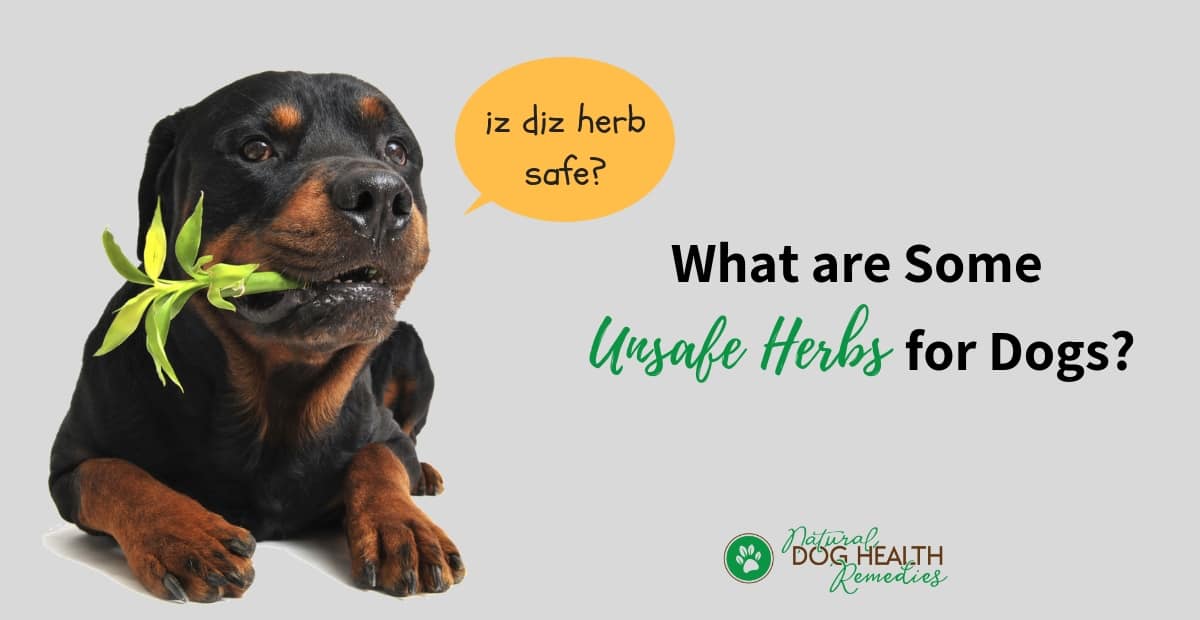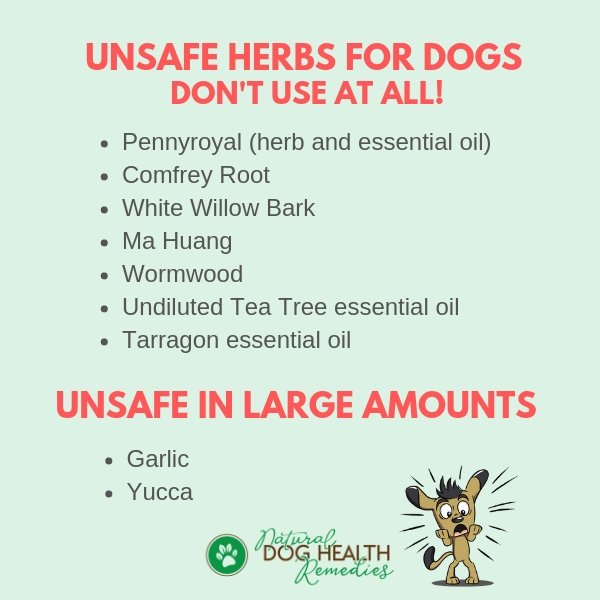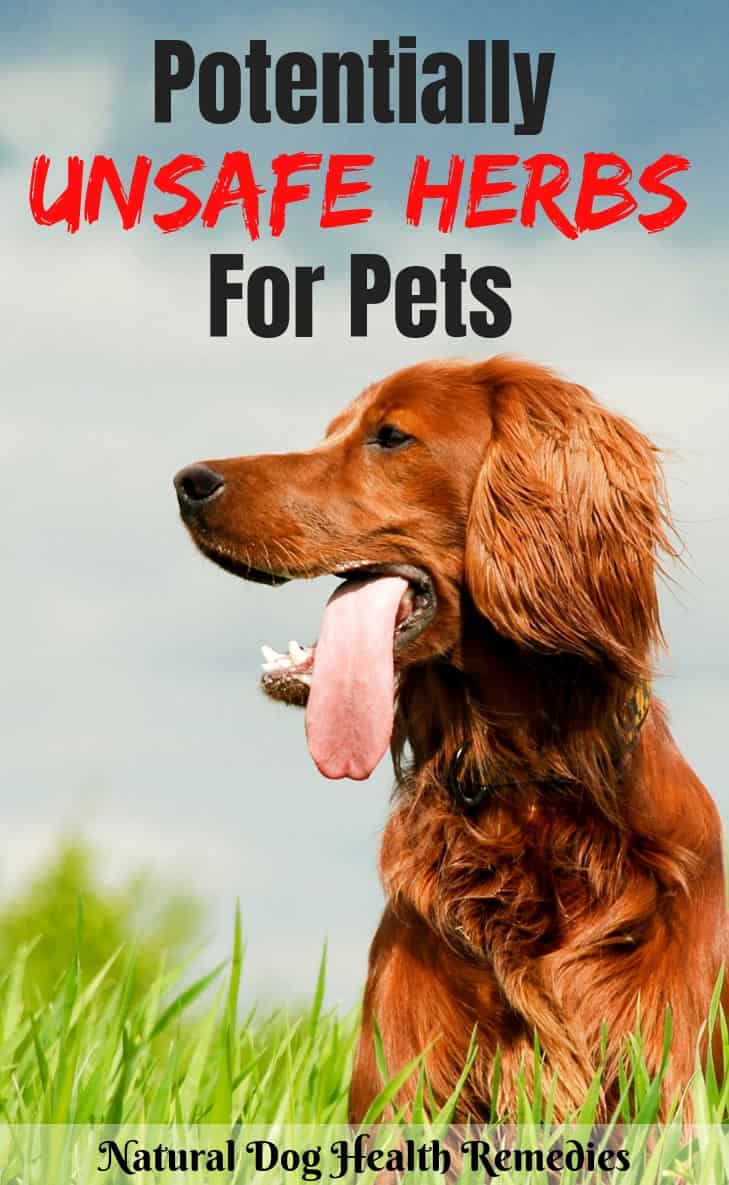Potentially Unsafe Herbs for Pets

Overview
Some people mistakenly believe that because herbs are "natural", as such they are "safe". The bad news is, that is not true.
Like any other therapeutical substances, certain herbs can cause side effects. Others can be toxic or even lethal to some animals when used inappropriately.
Sometimes an herb can cause side effects by itself; other times the use of an herb might interfere with the actions of a conventional drug. In addition, some herbs may increase the chance of side effects when used in conjunction with certain drugs.
But having said that, herbs are generally less likely to cause the type of nasty side effects caused by conventional medications.
The bottom line is, when you are unsure whether a certain herb is safe for your pet, consult a holistic vet first. This is especially important if your pet is on conventional medications, or is already weakened by certain health problems.

Unsafe Herbs for Pets
The following unsafe herbs are potentially dangerous for use in animals and care should be exercised when using them:
Pennyroyal (Mentha pulegium)
While this herb (and its essential oil) is an effective insecticide, it is toxic to dogs and cats at high doses.
In particular, it should NEVER be used in pets with existing kidney disease.
The essential oil of pennyroyal is extremely concentrated and, to be on the safe side, should not be used on dogs and cats, especially if they are pregnant.
Tea Tree oil (Melaleuca alternifolia)
Undiluted tea tree essential oil is VERY toxic to cats and small dogs. (In fact, cats are extremely sensitive to essential oils and it is better not to use essential oils on cats.)
For bigger dogs, use tea tree oil with care. Always dilute the essential oil (0.5-1%) in a carrier oil (e.g. olive or almond oil). Test a small patch of skin prior to use as some pets may be sensitive to the oil.
For more information on tea tree oil for dogs, please visit this page.
Comfrey (Symphytum officinale)
Comfrey contains small quantities of alkaloids that can cause liver damage or cancer if taken in large quantities or prolonged period of time.
Since the alkaloid concentration is ten times higher in the root than the leaves, DO NOT use comfrey root internally.
Comfrey dried leaves, on the other hand, contains very little alkaloids so use the dried leaves if needed.
If you plan to give comfrey leaves to your pet internally, use it for short periods and in moderation. Also, do not use comfrey in pregnant or lactating pets or those with pre-existing liver disease.
White Willow Bark (Salix alba)
White willow bark contains salicylates (same as in aspirin) which may be toxic to cats. Also, do not give this herb to your dog if he is taking NSAIDs (non-steroidal anti-inflammatory drugs).
Ma Huang (Ephedra sinica)
This Chinese herb is most commonly prescribed for pets with asthma or respiratory problems.
But beware! It can cause heart arrhythmias (irregular heartbeat) and high blood pressure in animals. Some reports also state that it may cause idiosyncratic reactions in cats. Use with great caution in all pets.
Tarragon (Artemisia dracunculus)
Tarragon is commonly used as a culinary herb. It has antioxidant properties, helps digestion, stimulates the appetite, and relieves stress and anxiety.
Used in small amounts, it is safe for dogs to eat.
However, do NOT use this herb medicinally (i.e. in large amounts) with dogs since it may slow blood blotting. In particular, it should NOT be fed to dogs who are pregnant, and should NOT be given to dogs who are scheduled for surgery.
The essential oil of Tarragon should NOT be used on dogs due to one of its chemical components, estragole. If used regularly, this component has been found to cause liver damage. The essential oil also may interfere with blood clotting.
Wormwood (Artemisia absinthium)
Wormwood is a traditional deworming herb but many herbalists find it too strong for pets. The reason is, wormwood contains strong volatile oils, tannins, and bitter principles.
If used excessively, it can irritate the liver and kidneys, and may even damage the nervous system in extreme cases.
The dilemma with wormwood is, if used in small amounts, it is ineffective in deworming. If used in bigger doses, it may cause problems to our pets!
Since there are other safer natural remedies for deworming, consider using other methods to deworm pets. Use wormwood with extreme caution and only under strict holistic veterinarian advice.
Yucca (Yucca schidigera)
If used in large doses or over an extended period of time, yucca can irritate the stomach lining and intestinal mucosa, which may cause vomiting and bloating.
If used in small doses, yucca is safe. Avoid giving yucca to your pets more than 4-5 times per week, more than a month or two at a time, or during pregnancy.
Garlic (Allium sativum)
Garlic in large amounts can cause Heinz body anemia in dogs and cats. (Therefore, it is not advisable to use garlic in pets with anemia.)
BUT - if fed in small amount, garlic is good for many uses, including the treatment of parasites such as fleas and worms, microbial infections, and in the treatment of cancer.
One clove of garlic per 10 pounds of body weight for dogs (and 1/2 clove per cat) can usually be fed safely each day.
Visit our page on Garlic for Dogs for more information on this herb.

Are Culinary Herbs Safe for Dogs?
I often get emails from visitors to my site asking if it is safe to give dogs culinary herbs, such as rosemary, thyme, basil, oregano, parsley, dill, fennel, and ginger.
These culinary herbs are safe for dogs. In fact, they are powerful antioxidants and rich in vitamins as well. You can definitely sprinkle some of these herbs on your dog's food on a regular basis so your dog can benefit from their nutritive and antioxidative properties.
Read this article for more information on how to use some culinary herbs to support and enhance your dog's health.
Possible Side Effects of Herbs on Pets
Different animals may react differently to the same herb. For example, certain herbs may cause slight allergic reaction in some pets, while other pets are unaffected.
Some possible side effects are:
- runny eyes and nose
- sneezing
- itching
- swelling
- diarrhea or vomiting
Interference with Conventional Medicines
 Certain herbs by themselves are safe but, when used in conjunction with some conventional medicines, may interfere with the conventional drugs.
Certain herbs by themselves are safe but, when used in conjunction with some conventional medicines, may interfere with the conventional drugs.
For example, herbs that have blood thinning properties (e.g. cayenne, garlic, ginger, gingko, ginseng, reishi, tarragon, turmeric) should not be used with anticoagulant drugs. Of course, if your dog is already suffering from a bleeding condition (e.g. stomach ulcer), these herbs should also be avoided.
To be safe, as a general rule, consult a holistic vet before using herbal treatments if your pet is on the following medications:
- Steroids
- Aspirin
- Antibiotics
- Cardiac drugs
- Hormones (e.g. thyroxine)
- Diuretics (e.g. Furosemide, Diazide)
- Diabetic/hypoglycemic drugs (e.g. Insulin)
- Central Nervous System drugs (e.g. phenobarbital)
- Anti-inflammatories (e.g. Rimadyl)
- Chemotherapy agents
J.A. Duke, The Green Pharmacy Herbal Handbook: Your Comprehensive Reference to the Best Herbs for Healing (Rodale Books, 2000).
C. Schwartz, Four Paws Five Directions: A Guide to Chinese Medicine for Cats and Dogs (Celestial Arts Publishing, 1996).
M.L. Wulff-Tilford and G.L. Tilford, Herbs for Pets (Bowtie Press, 1999).





